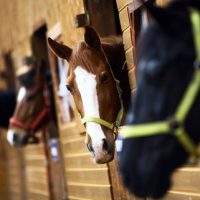Liability For Equine And Horseback Riding Accidents

Of all the sports and recreation activities that we have in Florida, there’s one that doesn’t get as much attention as many others: horses, horseback riding, and equine-based competitions and activities. Whether for competition, show, sport, or just fun, riding horses is a big activity in Florida. How safe is it to ride a horse and what safety considerations go with horseback riding?
Horses are Unpredictable
One inherent risk in riding horses is that you can be as safe as possible, but you can still have an accident; unlike a car or boat or motorcycle, where you can control them, there is a limit to how much we can control the behavior of a living animal.
Making matters more dangerous, a horseback rider is many feet off the ground, and when the horse is at full speed, the rider can be traveling between 30-40 miles per hour.
The rider is often strapped by his or her feet, which means that when the rider is thrown off, it is the rider’s head that goes first into the ground; much like the infamous paralysis injury that happened to Christopher Reeve, neck and paralysis injuries are common injuries when there are accidents when on horseback.
Even horses that behaviorally are fine and predictable, can still cause unexpected injuries. Riders can find themselves thrown off the horse when the animal steps into a hole, or an uneven surface; a rider’s head can be struck by a horse whose head bucks backward unexpectedly. A horse can easily be scared by something it sees, causing erratic behavior.
Liability of Those Who Hold Horseback Events
Many sponsors of equine based activities will have competitions. Some will bring horses to schools or birthday parties, so people can play with and ride the horses. Participants will often use the sponsors’ equipment. But the law makes it difficult to sue these sponsors, when there are injuries while riding their horses.
You generally will not be able to sue for any activity that is an inherent danger of riding a horse. You would be completely barred from suing or recovering any damages against the sponsor, if the nature of the accident is one that can reasonably be anticipated to occur when riding a horse.
Exceptions to Immunity
That immunity is only to the riding; it is not immunity for any dangerous condition on property the sponsor owns or manages.
The law does allow you to sue for horseback or equine related injuries, if the sponsor knew or failed to consider, whether or not the rider could manage the horse, or physically can be on the horse. But the law doesn’t require the sponsor to make any kind of in-depth investigation; they are allowed to rely on your representations. Unfortunately, many people who shouldn’t be on a horse, misrepresent their ability to physically be on, and manage, a horse.
Call the West Palm Beach personal injury attorneys at Pike & Lustig today for help with your injury case if you are injured on a horse or during an equine-based activity.
Sources:
riders4helmets.com/2011/02/equestrian-sport-statistics-facts-what-you-should-know/
animallaw.info/statute/fl-equine-activity-liability-statute-chapter-773-equine-activities
